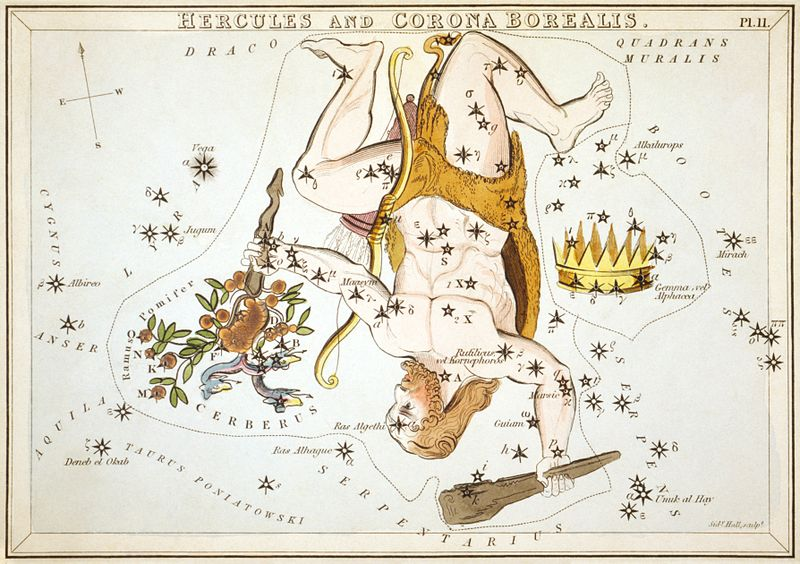 Hercules and Corona Borealis as depicted in Urania’s Mirror, by Sidney Hall, c. 1825 (Wikimedia Commons, Public Domain)
Hercules and Corona Borealis as depicted in Urania’s Mirror, by Sidney Hall, c. 1825 (Wikimedia Commons, Public Domain)
According to many multiforms of the Ariadne myth, Dionysus places Ariadne’s garland in the sky as immortal compensation and memory for the heroine.
Ovid, Metamorphoses 8.176-182 (trans. C. Filos) (Roman epic C1st B.C. to C1st A.D.)
Desertae et multa querenti
amplexus et opem Liber tulit; utque perenni
sidere clara foret, sumptam de fronte coronam
inmisit caelo. Tenues volat illa per auras
dumque volat, gemmae nitidos vertuntur in ignes
consistuntque loco specie remanente coronae,
qui medius Nixique genu est anguemque tenentis.
To Ariande abandoned and lamenting greatly,
Liber [=Bacchus] brings hope and embraces;
and so that she may be a famous among the everlasting constellations,
the garland crown taken from her brow
he hurled into the heavens. It flew through the thin air
and, as it flew, the gems turned into bright fires.
They stand in their place, retaining the appearance of a garland,
between the kneeling Hercules and the man holding the snake.
Ovid composed these lines over 2000 years ago, but the myth of Ariadne was ancient even then. According to Gregory Nagy, “the mythological foundations of storytelling about the garland of Ariadne and how it was turned into a constellation are most ancient, going all the way back to the Minoan-Mycenaean era.”[1] In his article, “Virgil’s verse invitus, regina … and its poetic antecedents,” Nagy explores a passage from another Roman epic, Virgil’s Aeneid.
456 infelix Dido, verus mihi nuntius ergo
457 venerat exstinctam ferroque extrema secutam?
458 funeris heu tibi causa fui? per sidera iuro,
459 per superos et si qua fides tellure sub ima est,
460 invitus, regina, tuo de litore cessi.
461 sed me iussa deum, quae nunc has ire per umbras,
462 per loca senta situ cogunt noctemque profundam,
463 imperiis egere suis; …
456 Unfortunate Dido! So it was true, then, the news that I got.
457 It came to me and said that you had perished, that you had followed through on your final moments with a sword.
458 So your death, ah, was caused by me? But I swear by the stars,
459 and by the powers above – and by anything here that I could swear by, under the earth in its deepest parts:
460 Unwillingly, queen, did I depart from your shore.
461 But I was driven by the orders of the gods, which force me even now to pass through the shades,
462 passing through places stained with decay, and through the deepest night.
463 Yes, I was driven by their projects of empire.
Virgil, Aeneid 6.456-463 (trans. Gregory Nagy)
Nagy argues that this passages might echo the content and language of the Ariadne myth as retold in a lost tragedy by Euripides. In developing his argument, Nagy draws upon the traditional descriptions of the Stephanos or Garland of Ariadne, as well as parallel myths about the Lock of Berenice. [Read the full text of this article now on the CHS website: “Virgil’s verse invitus, regina … and its poetic antecedents.”]
In Richard Strauss’ 1916 opera Ariadne in Naxos, Bacchus finds the heroine lamenting on the beach after waking to find that Theseus has left her. He immediately falls in love and swears an oath by calling on the stars:
Bacchus:
Hör’ mich, Wesen, das vor mir steht,
Hör’ mich, du, die sterben will:
Dann sterben eher die ewigen Sterne,
Als daß du stürbest aus meinen Armen!
Hear me, you who stand before me.
Hear me, you who wish to die.
The eternal stars will pass away
before you die in my arms.
(translation Kelley Rourke)
The Stephen Sondheim musical comedy The Frogs features a song titled “Ariadne” that offers a mock “lament” in which Dionysus sings about his former wife and her crown.
——–
Footnotes
[1] Nagy, Gregory, “Virgil’s verse invitus, regina … and its poetic antecedents.” Originally published in More modoque: Die Wurzeln der europäischen Kultur und deren Rezeption im Orient und Okzident. Festschrift für Miklós Maróth zum siebzigsten Geburtstag (ed. P. Fodor, Gy. Mayer, M. Monostori, K. Szovák, L. Takács) 155-165. Budapest.
